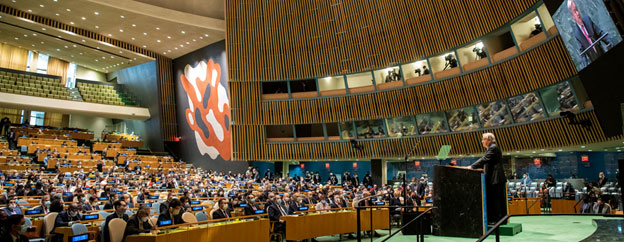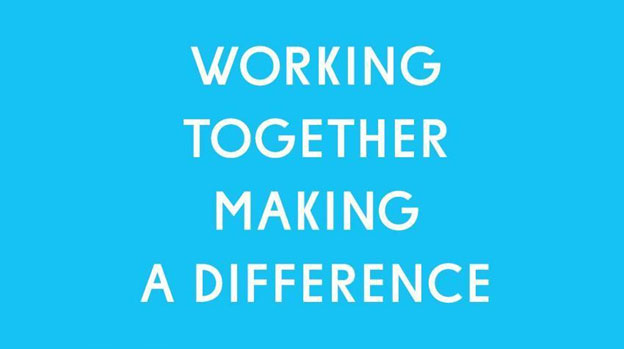UN Chief Urged to Create Civil Society Envoy

UNITED NATIONS, Oct 16 (IPS) - When the United Nations commemorated the 75th anniversary of the UN Charter back in 2020, Secretary-General Antonio Guterres paid a supreme compliment to Civil Society Organizations (CSOs).
The CSOs, he pointed out, were a vital voice in the San Francisco Conference (where the UN was inaugurated). “You have been with us across the decades, in refugee camps, in conference rooms, and in mobilizing communities in streets and town squares across the world.”
“You are our allies in upholding human rights and battling racism. You are indispensable partners in forging peace, pushing for climate action, advancing gender equality, delivering life-saving humanitarian aid and controlling the spread of deadly weapons”.
And the world’s framework for shared progress, the Sustainable Development Goals (SDGs), is unthinkable without you’, he declared.
But in reality, CSOs are occasionally treated as second class citizens, with hundreds of CSOs armed with U.N. credentials, routinely barred from the United Nations, specifically when world leaders arrive to address the high-level segment of the General Assembly sessions in September.
The annual ritual where civil society is treated as political and social outcasts has always triggered strong protests. The United Nations justifies the restriction primarily for "security reasons".
A coalition of CSOs-- including Access Now, Action for Sustainable Development, Amnesty International, CIVICUS, Civil Society in Development (CISU), Democracy Without Borders, Forus, Global Focus, Greenpeace International, Human Rights Watch, Oxfam International, TAP Network, and UNA-UK— is now proposing the creation of a Special UN Civil Society Envoy to protect, advance and represent the interests of these Organizations.

In a letter to Guterres, the coalition points out the disparity in access for civil society delegates viz. UN staff and members of government delegations who face no such restrictions stand as a critical reminder of the hurdles faced by accredited civil society representatives who travel great distances to contribute their perspectives at the UN.
“It is also a missed opportunity for civil society delegates to engage in key negotiations inside the UN headquarters and for policymakers to benefit from their critical and expert voices buttressed by lived experience in advancing the principles enshrined in the UN Charter,” the letter says.
Considering this recurring disparity, the letter adds, “we believe it’s vital to correct this injustice promptly to ensure opportunities for all stakeholders to contribute to discussions of global consequences”.
“This issue once again underscores the necessity for civil society to have a dedicated champion within the UN system, in the form of a Civil Society Envoy, who can help promote best practices in civil society participation across the UN and foster outreach by the UN to civil society groups worldwide, particularly those facing challenges in accessing the UN.”
“We would also like to express our support for the revision of modalities to ensure meaningful civil society participation at all stages of UN meetings and processes as well as Unmute Civil Society recommendations supported by 52 states and over 300 civil society organizations from around the world”.
“We believe that addressing the above concerns could lead to significant strides in advancing the ideal of a more inclusive, equitable, and effective UN in the spirit of ‘We the Peoples.’ “
Mandeep Tiwana, Chief Officer, Evidence and Engagement, at CIVICUS told IPS civil society representatives have long complained about asymmetries across UN agencies and offices in engaging civil society and have called for a champion within the UN system to drive best practices and harmonise efforts.
One such medium, he said, could be the appointment of a Civil Society Envoy along the lines of the UN Youth Envoy and Tech Envoy to drive key engagements.
Notably, a Civil Society Envoy could foster better inclusion of civil society and people’s voices in UN decision-making at the time when the UN is having to grapple with multiple crises and assertion of national interests by states to the detriment of international agreements and standards, he pointed out.
Five reasons why it's time for a Civil Society Envoy:
- Without stronger civil society participation, the SDGs will not get back on track. The UN’s own assessment laments the lack of progress on the SDGs. We desperately need stronger civil society involvement to drive innovations in public policy, effectively deliver services that ‘leave no one behind’ and to spur transparency, accountability and participation. A Civil Society Envoy can catalyse crucial partnerships between the UN, civil society and governments.
- Civil society can help rebalance narratives that undermine the rules based international order. With conflicts, human rights abuses, economic inequality, nationalist populism and authoritarianism rife, the spirit of multilateralism enshrined in the UN Charter is at breaking point. Civil society representatives with their focus on finding global solutions grounded in human rights values and the needs of the excluded can help resolve impasses caused by governments pursuing narrow self-interests.
- A civil society envoy can help overcome UNGA restrictions on citizen participation and create better pathways to engage the UN. As it does every year, this September the UN suspended annual and temporary passes issued to accredited NGOs during UNGA effectively barring most civil society representatives from participating. Further, civil society access to the UN agencies and offices remains inconsistent. Reform minded UN leaders and states that support civil society can prioritise the appointment of an envoy for improved access.
- More equitable representation. The few civil society organizations who enjoy access to UNGA heavily skew toward groups based in the Global North who have the resources to invest in staff representation in New York, or the right passports to enter key UN locations easily. A UN civil society envoy would lead the UN’s outreach to civil society across the globe and particularly in underserved regions. Moreover, a civil society envoy could help ensure more diverse and equitable representation of civil society at UN meetings where decisions are taken.
- A civil society envoy is possible. Getting anything done at the UN requires adhering to what is politically feasible. A civil society special envoy is within reach. The Unmute Civil Society initiative to enable meaningful participation at the UN is supported by 52 states and over 300 civil society organizations. It includes among other things a call for civil society day at the UN and the appointment of a UN envoy.
Recent UN Special Envoys include:
- Hans Grundberg (SWE), appointed Special Envoy of the Secretary-General for Yemen on 6 August 2021
- Noeleen Heyzer (SGP), appointed Special Envoy of the Secretary-General on Myanmar on 25 October 2021
- Geir Otto Pedersen (NOR), appointed Special Envoy of the Secretary-General for Syria on 31 October 2018
- Amandeep Singh Gill (IND), appointed Acting Special Envoy of the Secretary-General on Technology on March 10 June 2022.
- Hanna Tetteh (GHA), appointed Special Envoy of the Secretary-General for the Horn of Africa on 22 February 2022
- Xia Huang (CHN), appointed Special Envoy of the Secretary-General for the Great Lakes Region of Africa in April 2019
- Jayathma Wickramanayake (LKA), appointed Secretary-General's Envoy on Youth.
- Kofi Annan, a former Secretary-General, served as Joint Special Envoy for the United Nations and the Arab League for Syria during 23 February to 31 August 2012
- Michael Bloomberg, a former Mayor of New York city, was appointed Special Envoy for Climate Action on 5 March 2018. Bloomberg was previously appointed Special Envoy of the Secretary-General for Cities and Climate Change on 31 January 2014
- Gordon Brown was appointed Special Envoy for Global Education in 2012
IPS UN Bureau Report
Follow @IPSNewsUNBureau
Follow IPS News UN Bureau on Instagram
© Inter Press Service (2023) — All Rights Reserved. Original source: Inter Press Service
 Global Issues
Global Issues